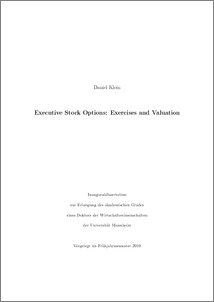|
Executive stock options : exercises and valuation
Klein, Daniel
![[img]](https://madoc.bib.uni-mannheim.de/3034/1.hassmallThumbnailVersion/Dissertationklein.pdf)  Vorschau |
|
PDF
Dissertationklein.pdf
- Veröffentlichte Version
Download (1MB)
|
|
URL:
|
https://madoc.bib.uni-mannheim.de/3034
|
|
URN:
|
urn:nbn:de:bsz:180-madoc-30340
|
|
Dokumenttyp:
|
Dissertation
|
|
Erscheinungsjahr:
|
2010
|
|
Titel einer Zeitschrift oder einer Reihe:
|
None
|
|
Ort der Veröffentlichung:
|
Mannheim
|
|
Hochschule:
|
Universität Mannheim
|
|
Gutachter:
|
Maug, Ernst
|
|
Datum der mündl. Prüfung:
|
11 November 2010
|
|
Sprache der Veröffentlichung:
|
Englisch
|
|
Einrichtung:
|
Fakultät für Betriebswirtschaftslehre > ABWL u. Corporate Finance (Maug 2006-)
|
|
Fachgebiet:
|
330 Wirtschaft
|
|
Fachklassifikation:
|
JEL:
C15 C61 G30 M52 ,
|
|
Normierte Schlagwörter (SWD):
|
Option
|
|
Freie Schlagwörter (Deutsch):
|
ESO , Option , Ausübung , Bewertung
|
|
Freie Schlagwörter (Englisch):
|
Executive stock option , exercise , valuation
|
|
Abstract:
|
The thesis consists of three independent papers on executive stock options ESOs Executive Turnover and the Valuation of Stock Options The objective of this paper is to develop a model for the valuation of ESOs. I estimate probabilities of early exercise or forfeiture based on a data set of almost 4,000 executives and apply the results for the valuation of a representative stock option. While I estimate factor models for the probabilities of turnover induced (forced) exercise and voluntary voluntary exercises due to personal considerations, the common practice valuation approach suggested by the Financial Accounting Standards Board (FASB) implicitly assumes early exercise or forfeiture at distinct point in time. I find that the FASB approach thus consistently underestimate ESO values, which makes it inapplicable as a conservative estimator for compensation expenses. I further use my model to analyze the impact of executive turnover on the valuation of ESOs and to compare it to the impact of voluntary exercise. According to my model, turnover induced exercises compared to voluntary exercises account for most of the valuation discount of executive stock options to market traded options. Given this, I suggest that future valuation models for executive stock options should give more consideration to turnover risk. How do Executives Exercise Their Stock Options? We analyze how 14,000 US top executives exercise their stock options. We run a horse race of competing explanatory approaches to identify the main variables that influence executives’ timing decisions. We find that the time value of the option, characteristics of managers’ option portfolios, and institutional factors (vesting dates, blackout periods) have a first-order impact on exercise behavior. Behavioral factors (e.g., trends in past stock prices) and timing based on inside information also influence stock option exercises, but are quantitatively less important. While there is evidence for some behavioral biases, managers seem to see through investor sentiment and tend to select rationally from their exercisable options. Fractional Exercises of Executive Stock Options In this paper I develop a theoretical model in which an executive exercises her option package (ESO) in fractions to diversify into other assets. I find that fractional exercises affects ESO values considerably for companies with highly volatile stock returns compared to a model with assumed block exercise (all options exercised together). Fractional exercises also make option packages to provide more incentives to the executive to increase the stock price. Analyzing exercise data, I find that executives have preferences to exercise their option packages in fractions of 20%, 25%, 33%, and multiples of those percentage numbers. Empirical observations that the second fractional exercise occurs at a higher stock price than the first one and that fractional exercise is more likely for high return volatility of the employer firm’s stock are borne out by my model. Furthermore, I find that large option packages are more likely be exercised in fractions and owners of numerous option packages to have a preference for block exercise, which can be explained by monitoring costs.
|
|
Übersetzter Titel:
|
Manageroptionen : Ausübungen und Bewertung
(Deutsch)
|
|
Übersetzung des Abstracts:
|
Die Dissertation beschäftigt sich mit Ausübungen von Optionen, die Manager als Teil ihrer Kompensation erhalten. Ausübungsentscheidungen sind insbesondere von Interesse da sie einen integralen Bestandteil der Bewertung dieser Optionen darstellen. Die Erkenntnisse der Arbeit basieren auf tatsächlichen Optionsausübungen US amerikanischer Manager. Die Dissertation besteht aus den drei unabhängigen Arbeitspapieren "Managerfluktuation und die Bewertung von Aktienoptionen", "Wie üben Manager ihre Aktienoptionen aus?" und "Teilweise Ausübung von Manageroptionen".
(Deutsch)
|
 | Dieser Eintrag ist Teil der Universitätsbibliographie. |
 | Das Dokument wird vom Publikationsserver der Universitätsbibliothek Mannheim bereitgestellt. |
 Suche Autoren in Suche Autoren in
Sie haben einen Fehler gefunden? Teilen Sie uns Ihren Korrekturwunsch bitte hier mit: E-Mail
Actions (login required)
 |
Eintrag anzeigen |
|
|
